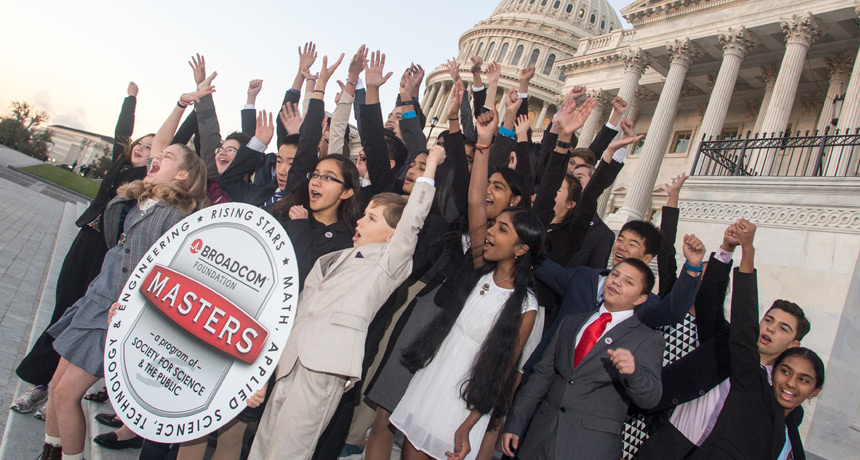When science blew up in my face, I learned…
Finalists at the Broadcom MASTERS share what they learned when they failed

The Broadcom MASTERS still love science, even though they've all messed up a few times.
L. Doane/SSP
WASHINGTON, D.C. — Finished science projects may look like the perfect combination of ideas, data and results, but they rarely start out that way. Everyone who does research will tell you that scientists fail — a lot. The trick is learning from your mistakes and turning your failures into success.
This week, 30 middle-school students and high-school freshmen from around the United States are meeting here for the 2016 Broadcom MASTERS competition. (MASTERS stands for Math, Applied Science, Technology and Engineering for Rising Stars.) It was created by Society for Science & the Public and is sponsored by the Broadcom Foundation. Society for Science & the Public also publishes Science News for Students and this blog.
The MASTERS finalists have all completed successful science projects. But many of them hit bumps along the way. Here, in their own words, they tell about the times they totally blew it in science — and what they learned from the experience.
My project is ‘Can a modified windmill create electricity in a traffic setting?’ .… The blades flattened, it was too heavy [and] it wasn’t sturdy enough. The car wasn’t the same distance away. There were lots of problems that I just can’t name. I learned that more duct tape is always the key, and…sometimes prototypes don’t go right, just keep trying. It’ll go right sometime.
– Rachel Pizzolato, 12
My project is ‘Optimizing the performance of a small-scale wind energy harvester for remote sensors.’ One time it failed because I was putting in [bubble] tea straws as flow straighteners into my test rig. I actually put them in too loosely, so when I turned on the fan, they all flew out. And so two hours of work was gone in five seconds…. I learned I should be more cautious when I’m doing things.
– Akhilesh Balasingam, 13
My project is about heart failure assist devices. One time it went wrong when my circuit almost exploded and I had to rebuild everything. [But] because I rebuilt everything, it started working and went perfectly, as I needed it to go.
– Ethan Levy, 14
One time, I failed at science because my task was to transfer Petri dishes from place to place, but I dropped [one] and E. coli [a type of bacteria] spread across the floor. I learned to be careful with biological materials!
– Aalok Patwa, 13
One time in sixth grade I was doing a wind turbine project, and one of the [light] bulbs for the electricity broke in the afternoon we tested it. Three of the four wings [of the turbine] fell out and it kind of destroyed a glass. I learned I needed supervision from family or an adult.
– Joaquin Haces Garcia, 14
My first science fair project completely failed…. I was testing how many holes you had to poke in a potato so it wouldn’t explode in the oven. One of the potatoes had zero holes; it failed to explode. I’m not sure why…. I had no data to draw a valid conclusion. So what I learned from that is repetition of the experiment can give your data more robustness that it would have otherwise.
– Lucas Ritzdorf, 14
My project is ‘Rockets and nozzles and thrusts, oh my!’ One time it kind of failed…I learned that my experiment was only producing 40 psi [pounds per square inch, a measure of pressure] when I actually needed it to do 100 psi…. My results were all off and I was like, ‘what happened?’ I was nervous at first, I thought I would have to rebuild my nozzles and do this and that. I thought about it and researched, and I learned I could just recalculate my theoretical results…. It was actually a lot easier.
When you have a mistake, don’t think about it too hard. Take it for what it is, sometimes mistakes can become happy mistakes.
– Eleanor Sigrest, 13
Follow Eureka! Lab on Twitter